Lasting impact: Adams Hall foyer named posthumously for Dr. Lamore J. Carter
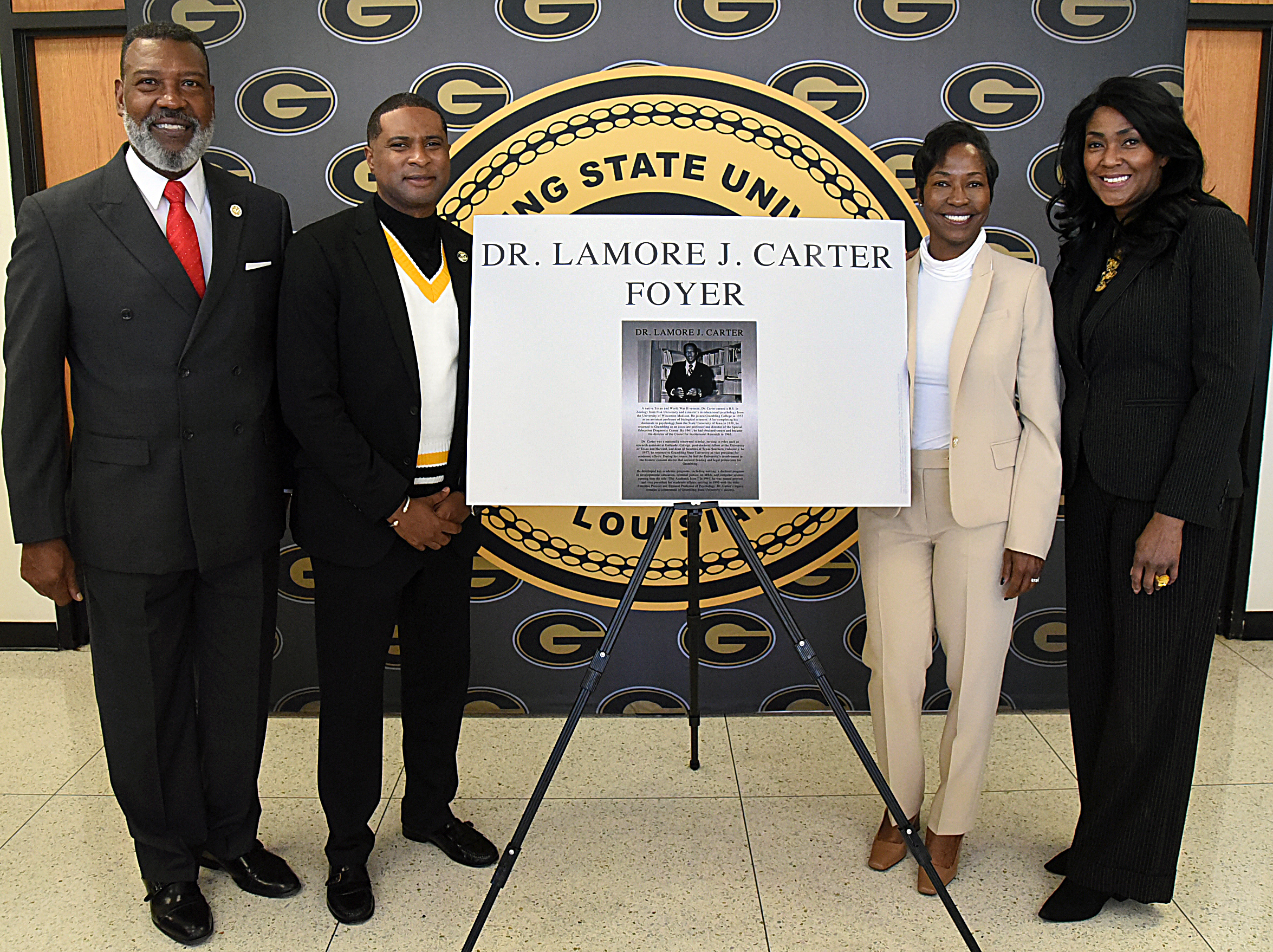
The impact the late Dr. Lamore Carter left on higher education and especially Grambling State University is still felt today, seven years after his passing at the age of 92.
And those impacts go significantly further than GSU, also reaching past Wiley College and Texas College, where he also worked, all the way to India, China, and Thailand, countries Carter traveled to in the 1980s and successfully negotiated with to develop and implement the state of Louisiana’s International Faculty Student Exchange Programs, bringing instructors from those countries to Louisiana.
Three years of military service instilled in Carter a love of traveling to foreign countries, which he described as the single most educational activity one can engage in.
And it’s because of all the impacts made at Grambling and other Louisiana colleges as well as Wiley and Texas Colleges that the late Carter was honored during GSU’s Homecoming festivities with the naming of the foyer at GSU’s Charles P. Adams Hall as the Dr. Lamore J. Carter Foyer.
Carter spent four decades working at Grambling State, serving in a number of roles from psychologist to professor to provost to vice president of academic affairs.
Immediately after graduating from Central High School in Galveston, Texas, in 1943, Carter was drafted into service during World War II and served in the U.S. Army for three years. During his years in service, Carter was awarded the Legion of Honor medal along with 16 other WWII veterans by the French consul general in 2014 to commemorate the 70th anniversary of D-Day.
After returning to the U.S. from the war, Carter diligently dived into his studies, earning a bachelor’s degree in zoology from Fisk University in Nashville, a master’s degree in educational psychology and science methods from the University of Wisconsin at Madison, and a doctorate in psychology from the State University of Iowa in Iowa City.
He also completed post-doctoral research in higher education management at Harvard University.
Grambling College was the first college to respond to inquiries from Carter about potential college teaching positions and was hired by President R.W.E. Jones in 1952 and taught psychology courses as an assistant professor of biological sciences and coordinator of human growth courses through the College of Education because a psychology department had yet to be established at the institution.
After four years at Grambling, Carter spent two years as a research assistant at the State University of Iowa, including a summer research assistantship at Gallaudet College for the Deaf in Washington, D.C. He returned to Grambling in 1958 as an associate professor.
In 1961, Carter was named the director and psychologist for Grambling’s Special Education Diagnostic Center, an experience which he told others was one of the highlights of his career.
Carter took on an even bigger challenge in 1965, when he became the director of Grambling’s Center for Institutional Research and was tasked with building and maintaining the new center.
It was midway through his teaching career, in 1969, that Carter began traveling to gain experience at additional colleges. He served as the first postdoctoral fellow in educational research for the Southern Association of Colleges and Schools, a distinguished visiting professor of psychology and education at Morehouse College in Atlanta, dean of faculties at Texas Southern University, and a postdoctoral fellow at Louisiana State University.
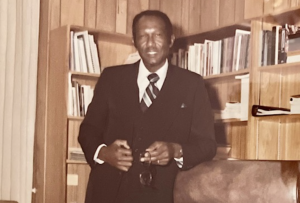
He returned to Grambling for the second time in 1971 as the associate dean for administration and research and was promoted to vice president for academic affairs and research in 1977, a position that he held until 1991.
And during that time as Vice President for Academic Affairs became a special place for daughters Greta Carter and Kris-Lana Carter.
Both had special stories to tell during the ceremony recognizing the renaming of the foyer held on Oct. 17.
Greta Carter spoke of one special Adams Hall memory that vividly remains with her today.
“My first semester here, my freshman year, coincided with my dad becoming VP of Academic Affairs,” she said. “Now there were a few professors that didn’t know me, or us, and I didn’t tell them who I was just in case this VP thing didn’t work out. In hindsight, when I look back on some of the conversations we had, one comes to mind.
“Every year, my dad asked me how classes were going. One time I said, ‘Whoo, I’m going to change my schedule because I had a class with a professor from India and I don’t understand what he’s saying, so I’m going to change my schedule.’ Those four words that every educator hates — I’m not worth anything.”
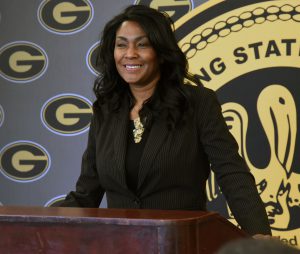
Greta Carter said her father didn’t respond until the following day.
“The next day, I marched right through this foyer past his office to my advisor,” she said. “And she was ready for me. I said, Ms. Woodard, I need to change my schedule. She said my father had come through and then pushed a memo over to me. That memo from my dad said that no students at Grambling State University shall be granted change of schedule without going through the proper channels of communication — professor, dean, department head, Vice President of Academic Affairs, President.”
Greta Carter said that Ms. Woodard then told her that her father had a special message for her and told her that he suggested that she move to the front row so that she may hear and see better because he said when he recruited, interviewed and hired that professor, he chose the perfect candidate.
“That was that, and from then on, Greta Carter sat on the front row,” Carter said. “And I never, ever complained that I wasn’t learning anything because what I learned from that was that the onus of learning was on me and when you think globally, which he what he said later, I too have an accent and if I listen closely and pay attention, I shouldn’t have a problem being successful. That is my story with my dad.”
Retired Air Force Lt. Col. Kris-Lana Carter also has special memories of her father and Adams Hall.
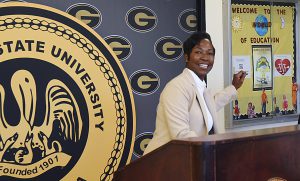
“For 40 years as I pass this building, I think about the life change that happened for me in this building,” Kris-Lana Carter said.
She then told a story about ending up in swimming class in which she was the only female in a class full of football players.
“I did not want to wear a swimsuit,” Kris-Lana Carter said. “So, I marched myself over to (Adams Hall) upset and told them I wasn’t doing it because there were no other girls in that class. And he said that he thought the only thing I could do was go get into the (Air Force) ROTC.
“He said he had just hired someone to oversee the program and that I needed to go see. So I saw this stunning beautiful, deep chocolate woman with salt and pepper hair with an Air Force uniform, high heels, a skirt, and all of this was shining.”
It was USAF Lt. Col. Rosetta Amour-Lightner.
“(She) was the first Black female instructor in an Air Force ROTC Unit — period,” Kris-Lana Carter said. “Daddy had hired her to become commandant. She was the first African American to make the rank of colonel. Back then, you had to be a pilot, navigator, a physician or an attorney. She was none of that.
“When I went over there and saw her, she told me she was expecting me. It was like sunshine was shining everywhere. And now here I am, retired. It was the best decision of my life. My father knew me better than I knew myself. He saw it. And I never looked back, never regretted anything.”
Kris-Lana Carter’s husband Dr. Stan Armstead shared a close bond with his father-in-law and also paid tribute to Dr. Carter.
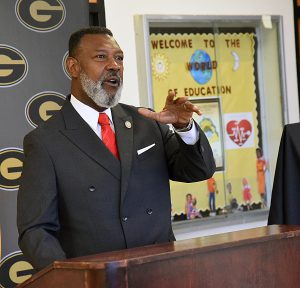
“He was a great man, and I remember the last time we were in Arlington (National Cemetery), and we were talking about him being part of the Red Ball Express (in WWII), and he had just received his second French Foreign Legion Award.
“And as we walked, we talked through Arlington he looked back and said, ‘Now keep up with me.’ And I made that promise I was going to keep up with him. I loved that man. I love Grambling, and it’s heartfelt.”
Grambling State President Dr. Martin Lemelle, Jr. thanked the Carter family for a financial legacy gift while making his remarks to close out the foyer naming ceremony at Adams Hall.
“We just want to thank the Carter family for their investment in Grambling State University,” Lemelle said. “It really showcases the ability to have transformative gifts. When you think about legacy, think about your own and how Grambling State University can be part of that and celebrate so many of our ancestors who were champions of this institution.”

